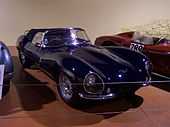Jaguar XKSS
| Jaguar XKSS | |
|---|---|
 | |
| Overview | |
| Manufacturer | Jaguar Cars |
| Also called | Jaguar XK-SS |
| Production | 1957 |
| Assembly | Coventry, UK |
| Body and chassis | |
| Class | Sports car |
| Body style | Roadster |
| Related | Jaguar D-Type |
| Powertrain | |
| Engine | Jaguar XK6 engine |
| Transmission | 4 speed manual |
| Dimensions | |
| Wheelbase | 2,300 mm (90.6 in) |
| Length | 3,990 mm (157.1 in) |
| Width | 1,660 mm (65.4 in) |
| Height | 1,120 mm (44.1 in) |
| Kerb weight | 921 kg (2,030 lb) |
The Jaguar XKSS was a road-going version of the Jaguar D-Type racing car.
After Jaguar withdrew from racing the company offered the remaining, unfinished chassis as the road-going Jaguar XKSS, by making changes to the racers: adding an extra seat, another door, a full-width windscreen and folding top, as concessions to practicality. However, on the evening of 12 February 1957, a fire broke out at the Browns Lane plant destroying nine of the twenty-five cars that had already been completed or were semi-completed. Production is thought to have included 53 customer D-types, 18 factory team cars, and 16 XKSS versions.
Following Jaguar's withdrawal from competition at the end of the 1955 season, a number of completed and partially complete D-types remained unsold at the Browns Lane factory. In an attempt to recoup some of the investment made in building these unused chassis, and to exploit the lucrative American market for high-performance European sports cars, Sir William Lyons decided to convert a number to full road-going specification. Only minor changes were made to the basic D-type structure: the addition of a passenger side door, the removal of the large fin behind the driver's seat, and the removal of the divider between passenger and driver seats. In addition, changes were made for cosmetic, comfort and legal reasons: a full-width, chrome-surrounded windscreen was added; sidescreens were added to both driver and passenger doors; a rudimentary, folding, fabric roof was added for weather protection; chromed bumpers were added front and rear (a styling cue later used on the E-type); XK140 rear light clusters mounted higher on the wings; and thin chrome strips added to the edge of the front light fairings. In total 16 XKSS variants were made, with most being sold in the USA, before the Browns Lane fire destroyed the remaining chassis.
The American actor Steve McQueen owned a Jaguar XKSS for personal use, painted British racing green. He referred to the car as the "Green Rat".[1] In 2010 and 2011 it toured the United States as part of the "Allure of the Automobile" exhibit.
References
| Jaguar Cars road and race car timeline, 1940s–1970s — next » | |||||||||||||||||||||||||||||||||||
|---|---|---|---|---|---|---|---|---|---|---|---|---|---|---|---|---|---|---|---|---|---|---|---|---|---|---|---|---|---|---|---|---|---|---|---|
| Type | 1940s | 1950s | 1960s | 1970s | |||||||||||||||||||||||||||||||
| 5 | 6 | 7 | 8 | 9 | 0 | 1 | 2 | 3 | 4 | 5 | 6 | 7 | 8 | 9 | 0 | 1 | 2 | 3 | 4 | 5 | 6 | 7 | 8 | 9 | 0 | 1 | 2 | 3 | 4 | 5 | 6 | 7 | 8 | 9 | |
| Sports | XK120 | XK140 | XK150 | E-type S1 | E S2 | E-type S3 | XJ-S | ||||||||||||||||||||||||||||
| Saloon | Mark 1 | Mark 2, 240, 340 | |||||||||||||||||||||||||||||||||
| S-Type | XJ-C | ||||||||||||||||||||||||||||||||||
| 420 | XJ6 S1 | XJ6 S2 | |||||||||||||||||||||||||||||||||
| Mk IV | Mk V | Mk VII | Mk VIII | Mk IX | Mk X | 420G | XJ12 S1 | XJ12 S2 | |||||||||||||||||||||||||||
| Supercar | XKSS | ||||||||||||||||||||||||||||||||||
| Racing | C-Type | D-Type | E-Type | XJ13 | XJ-C | XJ41 / XJ42 | |||||||||||||||||||||||||||||
| Ownership | Independent | BMH | British Leyland | ||||||||||||||||||||||||||||||||